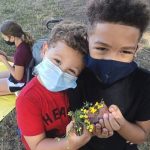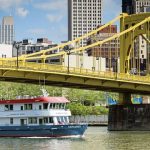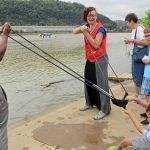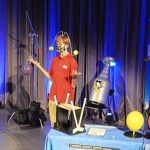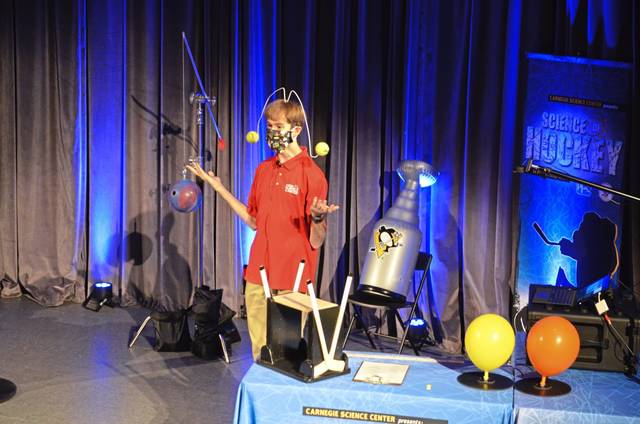Summer is a time for vacations, picnics, fun in the sun and the dreaded educational slide.
When students head back into the classrooms after summer break, teachers expect them to have lost some of the knowledge they gained the previous school year. This could be even more true after the last school year (and a half) was impacted by the coronavirus.
“Our school communities have experienced and continue to experience many challenges during the pandemic, and learning loss is a significant issue students are facing in Pennsylvania and across the nation,” Acting Secretary of Education Noe Ortega said. “We collectively still have a long way to go to understand the long-term impacts and effects of covid-19 on education.”
So this summer, keeping that slide to a minimum is especially important. Here are some strategies for doing just that.
Science is fun
Science influences many aspects of daily life in countless ways. It also helps shape the development of life skills from an early age. As children learn to communicate, think critically, make predictions and form opinions based on their observations, they are developing science skills that will last a lifetime, according to Family Features.
Many of those skills can be refined during the summer at the Carnegie Science Center on Pittsburgh’s North Shore. It’s offering both virtual and in-person activities.
Many of the learning programs are led by Nikole Sheaffer, senior director of STEM education at the science center. She has a teaching background and previously worked at a charter school.
“We are so excited to welcome children back to the science center,” Sheaffer said. “This summer is a time for them to reconnect socially with friends. It’s about introducing them to new things. We want to engage them as they start to come back out after 14 months at home because of the pandemic. And not only the youngsters but their siblings and parents, aunts, uncles and grandparents as well.”
Sheaffer said summer is a time to take a break from the traditional school atmosphere. It can be used as a way to bridge the gap between June and September. Introducing children to new experiences can also help with their mental health. She said it is important to take note of children’s emotional well-being, especially as they come out of being at home a lot because of the pandemic.
“We want to help with the healing process from the pandemic,” Sheaffer said. “It is important to ask children how they are feeling or what they are thinking about.”
Science on the “Road/Camptastic” began June 24 and runs every Thursday from 1 to 2 p.m. through Aug. 19. Youngsters learn virtually through science experiments. “The Science of Hockey” is new this year. It explores the geometry, physics and physiology behind hockey. “Who Wants to Be an Engineer: Imagine It. Make It. Make it Better! — Ramp Up for Double Dare” is inspired through how basic machines work to building towers and suspension bridges. “Wild by Design: Innovations from A to Zoo” is a collaboration of local scientists and onscreen zoo animals for a bio-inspired adventure with leaf-blowers, foamy chemistry and liquid nitrogen rockets.
At “Flight School,” kids explore potential and kinetic energy and experiment with Newton’s Laws of Motion. The Science Olympics teaches the science of sports. Kids learn about obstacle courses and relay races, construct catapults and balconies, and design, test and race rafts and cars.
Through its “Wonder of Science” initiative celebrating bringing innovation to kitchen tables for 100 years, Wonder Bread is helping to support ongoing scientific learning for students across America. In partnership with AdoptAClassroom.org and Emily Calandrelli, an American science communicator, MIT engineer and co-executive producer and host of “Emily’s Wonder Lab” on Netflix, the bread manufacturer is donating $100,000 to provide U.S. middle and high schools with supplies and equipment for science education and presenting an online series of science experiments for students.
Allowing children to put those science-based skills to the test at home can be both simple and fun. Whether you head outside to identify clouds and species of animals or work on crafts indoors, there are plenty of everyday learning scenarios that allow parents to get hands-on with their children’s education.
Bake together
Baking can be a fun (and tasty) way to introduce scientific experimentation by following a recipe to see how the ingredients react together — or with too much or too little of a certain ingredient — and testing the end product against the desired results. As recipes are mixed, heated and cooled, baking introduces a variety of chemical reactions, including water evaporation, caramelization, browning and more.
Start a garden
Getting outside at one of the 164 parks in the city of Pittsburgh is a perfect activity for summer learning, said Jen Schnakenberg, assistant director of education for Pittsburgh Parks Conservancy. She said they saw a huge increase in park users last year and believe that will continue.
“Parks are spaces where people feel safe and they can relax and also do things that are healthy like running and taking walks,” she said.
The conservancy set up a link on its website called Parks on the Go, where it offers a variety of resources such as learning from home, events happening to help stay healthy and ways to get involved. There is information about what kids can discover in their own yard.
“The summer is the perfect time to be outside,” Schnakenberg said. “Kids can run and jump and climb. They learn how exercise can help their bodies.”
The conservancy hosts story time at 10 a.m. Thursdays in Allegheny Commons on Pittsburgh’s North Side and at 10:30 a.m. Fridays at Schenley Plaza in Oakland.
One of the best ways to introduce children to a variety of plant species and the process through which they grow is to grow your own garden. Start by letting the kids pick some plants or vegetables that germinate and produce a crop quickly, such as carrots or petunias, then choose a location to plant. Test and prepare the soil then plant your seeds and water as needed. Visit wonderbread.com for more information.
Looking back through history
Building an appreciation for history is one way to help kids understand and connect with the world around them. History not only shows how people lived long ago, but it also gives clues about how society evolved into what it is today.
From playing games and visiting museums to exploring cultural heritage sites virtually, there’s no shortage of ways to engage kids in fun history lessons.
Historical literature
From traditional bound books to digital formats, there’s a practically endless list of titles dedicated to historical people, places and events. If your child has an interest in a particular topic, consider starting with an age-appropriate nonfiction book that gives a high-level perspective of the topic. Then delve deeper by looking into biographies about the people involved and even related fictional tales to build knowledge and a broader perspective.
Movies or theater
Like books, there are hundreds of options for historically themed movies and theatrical productions. All you need to do is pick a topic or era. It also can be fun to look at how different movies depict the same historical topic at different points in time. Watching different genres can help give a fuller picture of an event or topic. Informative documentaries and entertaining historical dramas also are options for looking into the past.
The Rangos Giant Cinema inside the science center reopens July 3 with the documentary “The Search for Snow.” Guests can follow weather patterns that make snow from the French Alps to Rocky Mountain peaks and discover the story of the changing influence of snow on wildlife and humans.
Virtual and in-person tours
Another way to look at history is through visiting historical destinations with cultural significance. Travel isn’t always practical, but you can go nearly anywhere in the world with a virtual tour where you can move around sites and monuments to see the details up close. An option like Flyover Zone’s app-based tours even take you a step beyond seeing the monuments as they look today. You can see ruins as they are today and beautiful virtual reconstructions of how they originally looked.
One example is “Baalbek Reborn,” a tour of Baalbek, a World Heritage Site in Lebanon, that dates back thousands of years. With this free virtual tour, you can explore the ancient city of Heliopolis, meaning “City of the Sun,” in Roman times. Experts from the German Archaeological Institute who explored the site guide you through the tour and show you treasures that have been compared to some of Rome’s most impressive landmarks.
Local tours are hosted by Rivers of Steel, an organization that focuses on Pittsburgh’s industrial heritage. It offers tours on the city’s rivers Fridays, Saturdays and Sundays through the end of August on a boat called the Explorer.
The cruises are more than a chance to see views from the Ohio, Monongahela and Allegheny rivers. They offer information about the city’s history, said Brianna Horan, manager of tourism and visitor experience for Rivers of Steel.
“Guests learn about the health of the rivers through testing the waters,” Horan said. “They learn about riverbeds and immigrants who settled on the South Side and the steel industry, where some steel mills have been replaced by the technology center on Second Avenue. We talk about the Hill District’s jazz culture and Negro League baseball.”








